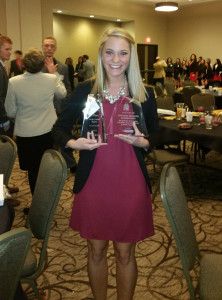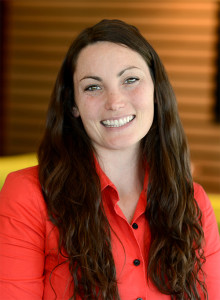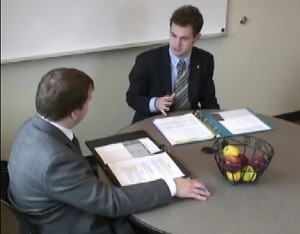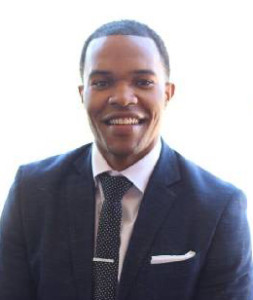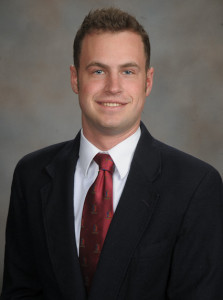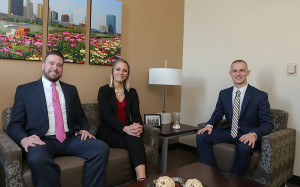Sales isn’t about selling
Alumni, students succeed in sales field through UT’s highly ranked Edward H. Schmidt School of Professional Sales
By Laurie B. Davis
Stephanie Elkins never thought she’d be in professional sales when she took her first classes in the field. She had no sales experience, and her vision of sales was that of the stereotypical used car salesman who wants to sell you a lemon as he hounds you in the parking lot. “It’s the guy nobody wants to talk to,” she says.It wasn’t until Deirdre Jones, Director of the Edward H. Schmidt School of Professional Sales (ESSPS) at The University of Toledo, convinced Elkins to compete in the Internal Sales Competition that Elkins learned what professional selling involves and how it might be her career calling. The image of the used car salesman vanished when she took first place in the junior division of the competition in March 2015. She then continued to collect top sales honors in a Pi Sigma Epsilon Pro-Am Sellathon in November 2015 and a Pi Sigma Epsilon National Pro-Am competition held in March 2016, in which she also was named Top Salesperson of the Day.
Elkins, a Columbus native and a current professional sales student, is one of 200-plus students enrolled in the professional sales program. It offers shared learning experiences, networking and recruitment opportunities, and an open and professional exchange of ideas about industry issues.
Joining Elkins in a class of first-place winners in competitions that took place during the 2016 academic year are Ale Vera and Lexi Jarrett, who placed first in the Graduate Division of the National Collegiate Sales Competition, and Jacob Pawelszyk, who placed first in the Quicken Loans Sales Competition.
“ESSPS is consistently recognized as one of the top sales schools in the country, which is why it is able to attract major sponsors such as 3M, Goodyear, Owens Corning, Quicken Loans and Proctor & Gamble for its annual University of Toledo Invitational Sales Competition,” says Dr. Gary Insch, Dean, UT College of Business and Innovation. “ESSPS’s outstanding educational program has earned the school and its faculty a fantastic reputation among companies who actively recruit our students, resulting in a virtual 100 percent job placement rate for our sales students. The continued success of ESSPS is a perfect example of COBI’s overall mission, which is developing lifelong leaders for the world of business.”
UT sales students learn how to navigate complex sales by building trustworthy relationships with clients and customers. “Students in the program are taught how to be the customer’s consultant and to teach the customer about the value added,” says Jones. “Sales isn’t about selling; it’s about teaching someone how to buy.”
Challenges get personal
Brittany (Meighan) Johnson (Bus ‘08, Honors ‘08), who has worked in sales for the construction tools and equipment manufacturer, Hilti, for four and a half years, wanted a career in which she could use her outgoing personality to meet and talk with different people and help their businesses grow. “Sales is about relationships and asking the right questions. In any career, you’ll have to sell something, an idea, a proposal, and you need to have a clear picture of what that is,” says Johnson.The Westerville, Ohio, resident says taking the Myers Briggs Personality Test in one of her classes was pivotal in directing her to the sales profession. “The personality test made me understand my thoughts, it really changed my perspective about myself.” She learned she also possesses a knack for details, a skill that complements her ability to easily converse. Those traits meshed well in her role at Hilti, the company that recruited Johnson.
Jones and other faculty members encouraged Johnson, just as they encourage all students, to challenge herself to acquire the sales acumen needed to succeed. The national UT Invitational Sales Competition, which is the only contest in the nation specifically designed for non-seniors, is the prime opportunity to assess one’s abilities and to network with companies for internships and post-graduation careers. One component of the competitions is role-playing, also incorporated into courses. Organized as an exercise in reality—a sales scenario plucked from a real-life situation with a customer and a seller gets played out and recorded for review, feedback and judging. In the mix of negotiation, the seller must focus and evoke their conceptual selling skills.
“Role plays were great, but stressful; that’s the business world,” says Johnson. “You’re always going to be unprepared for things that you weren’t expecting.” But, she adds, “The value of learning sales skills is that you can sell yourself or convince your team about an opinion you hold. They’re applicable skills.”Johnson likes to return to the Schmidt Professional School of Sales to judge competitions or to recruit and hire new “highly qualified, well-trained” students. “What separates UT sales students apart from their counterparts is their understanding of quality work,” says Johnson. “We expect Toledo to be producing high-caliber students. I’m not sure my colleagues who didn’t attend UT feel the same pride in their universities, as me and my colleagues who did go to Toledo. We really appreciate the quality of the curriculum.” She also expects the best results from her talent search. “I just know that I’m going to find someone good, the right recruit at Toledo.”
Sharpening the rough edges
Mike Steel (Bus ‘05), executive director of global commercial payment-U.S. large markets for American Express, had two genuine aspirations when he first enrolled at The University of Toledo. He wanted to play football for the Rockets and he hoped to one day live on the East Coast. As the first member of his family to attend college, Steel, a native of Cincinnati, arrived on campus with no family or friend connections in Northwest Ohio. When his hopes to walk on the football team didn’t materialize, he channeled his energies into his studies, he says.“When I went to the University of Toledo, I didn’t know what my major was going to be,” says Steel, who also earned his MBA in 2011 at Howard University. “At the time I was in school, Toledo was one of the only schools offering the major in professional sales. I took an intro class with Deirdre Jones, so I just stumbled upon it.
“I always had sales ability when I was younger, without really being conscious of it. In high school, I used to cut hair to make money. My brother did it and so I did it, too.” He describes those early sales skills as “rough and natural,” but through his tenacity and supportive faculty members, Steel sharpened his ability to sell. “The University of Toledo helped craft and build that in me,” he says. “They used clear philosophies, and professor Jones was vitally instrumental. She made it tangible. We learned how to do probing, where you learn to better understand the client. When we applied for scholarships we had to do interviews, and you had to sell yourself, and be confident.”
Steel describes Jones as “a catalyst,” for recognizing his academic gifts and pointing out specific selling tactics he used in role playing as on target. He says the sales program positively influenced his career path, which took him to New York and now to Philadelphia. His six-year tenure at American Express also took him abroad as an International Marketing Manager. For Steel, the rewards of graduating from UT’s sales program are life-changing. “The opportunity to work globally, doing business in another country,” has been very beneficial, he says, and the roster of companies that recruit UT students comprises an impressive group. “They helped me define what I wanted, and to go after it and get it.”
He advises anyone interested in professional sales to study the successes of the top sellers they admire. “Look at the top sales people and what got them there. What skill set they have. Those are the skills you’re going to be able to hone at Toledo.”
Get out of your comfort zone
Alumnus Jordan Gannon (Bus ‘14), agrees that opening oneself up to global opportunities, whether to study abroad or work internationally, is one way to experience the unknown and the uncommon, which can give someone a professional advantage. “You want to be doing something that sets you apart. It’s very important to get comfortable with being uncomfortable.”Gannon also considers broadening one’s networks while in school a worthwhile time commitment. “In any career, networking is the most important thing.” He says those opportunities were abundant at UT where he participated in sales contests, career fairs, and networked with alumni in formal and informal settings. He also recommends the Alpha Kappa Psi fraternity, an organization on campus within the College of Business and Innovation. “It’s the largest co-ed fraternity in the country.”
If Gannon had to sell the Schmidt Professional Sales Program to an undergraduate who was interested, yet undecided, he says he would emphasize a few personal perks of being in sales. “If you’re outgoing and like to be in charge, be your own boss,” as cliché as that may sound, he adds, “setting your own schedule is great.” He adds that today’s technology allows you to work remotely, using all things mobile, which provides a sense of freedom and excitement. Gannon also notes that many company CEOs began their careers in sales.
Although his parents didn’t have the chance to enroll in the Schmidt Professional Sales Program at The University of Toledo, they both are UT graduates, and they work in sales. His younger brother, Justin, is now an accounting student at UT. Gannon says Toledo has the best school for professional sales, and for him it was a natural fit. A professional sales and marketing double major, Gannon – based in Louisville – is now a territory representative for 3M, covering Kentucky, Indiana, and southeast Ohio. He says he liked UT’s specialized focus on sales, which differs from traditional sales courses that often are built into a marketing degree.
He will return to campus from Feb. 23 to 25 to judge a competition. The reality-based environment of the contests and internships are first-rate, he says. “There’s a whole elaborate plan, pushing your creativity to do whatever you can to make a good impression,” on the judges.
“Very few colleges have as much prestige as the University of Toledo. It’s one of twelve degrees with a professional sales major offered in the country,” he adds “They give you the tools you need, and it’s up to you to use them.”
Navigating the professional sales landscape
Two current sales students, Patrick Witter and Patrick Shaughnessy, are sharpening their skills as they engage in internships and sales competitions.Witter spent last summer prospecting for potential new sales in the business-to-business company LiftMaster, which manufactures garage door openers and security gates. He worked out of Elmhurst, Ill., assisting an outside account manager whose territory covered Maryland, Virginia and West Virginia. “It was kind of exciting and kind of overwhelming,” Witter admits. But, his ability to develop 220 new sales leads that could bring as much as $1.1 million in profits resulted in a successful pipeline of prospective customers.
Witter enjoyed the territory management course he took in the Schmidt School of Professional Sales, and praises the faculty for sharing not only their academic expertise but also the real-life examples that back up those lessons. Witter also has reaped the benefits of Prof. Michael Mallin’s class, to which Mallin invites alumni who share the steps they’ve taken in their careers.
Part of what attracted Witter to UT’s sales program was knowing he had excellent chances of finding a great job after graduation. “I knew about the College of Business and Innovation’s ability to get students placements,” he says, and that reputation plays out in the placement ratings the Schmidt School of Professional Sales has reached.
For Shaughnessy, an internship with Crown Equipment, began with a serendipitous encounter at the University of Toledo Invitational Sales Competition last year. Shaughnessy was one of the alternate contestants who receive coaching from faculty and company representatives participating in the competition.
Shaughnessy was looking out for a fellow classmate who was set to compete one morning. He knew his friend hadn’t eaten yet, and Shaughnessy didn’t want him competing on an empty stomach. So, he bought him a breakfast sandwich and delivered it. When he jumped on the elevator upon his return, he ran into Chris Schwartz from Crown Equipment, one of the recruiters at the event. Schwartz was looking for the coaching room for the alternates where Shaughnessy was headed. The two talked, and Shaughnessy had the opportunity to give his personal “elevator pitch,” so to speak. “He explained the culture and the camaraderie,” of Crown, says Shaughnessy, and those appealed to him.
The result of that chance meeting was an internship, after Schwartz referred Shaughnessy to a manager in Cleveland. At Crown, which manufactures forklifts and lift trucks, Shaughnessy sat in on sales calls being placed by company staff. He says that out of a dozen or so other interns, he won an internal company competition, in which interns earned points for specific activities, including outside calls.
Shaughnessy says his UT training shows students how to handle objections, and to use a line of questioning that gets into the psychology behind it. “The big takeaway has been learning SPIN selling,” says Shaughnessy. A mnemonic device, SPIN stands for “Situation,” “Problem,” “Implication,” and “Needs payoff,” a method that helps guide sellers through parts of the customer dialogue and decision-making process. The last piece of the method, “needs payoff,” refers to how the seller is aiding the buyer. “You’re selling solutions and not just making another sale,” says Shaughnessy.
Anticipated outcomes
The one-on-one transactional sales of the used car salesman are not the focus of the Schmidt School of Professional Sales curriculum. Jones and other faculty members teach students how to sell in the business-to-business world of sales. Depending on the product, service or industry, selling begins at the distributor level.Tenneco, a company that recruits UT students and manufactures Original Equipment and Aftermarket parts for automobiles, produces ride control shocks and struts. “Tenneco market specialists interact with all three levels of parts distribution and sales,” says Jones. “From the warehouse distribution, to the jobber, like an O’Reilly’s, and to the installer, such as a Goodyear. Sixty percent of vehicles go to the graveyard with their Original Equipment ride control,” she says. When the Tenneco market specialist interacts with the installers, “they are teaching shops about safety that they can pass along to the customer by educating them that replacing these parts can resolve safety issues, and they’re a cost-saving measure.” The anticipated outcome is that everyone benefits: revenues are increased, better inventory is developed, and the customer experience improves.
Elkins, who earned top honors in the sales competitions, will be focusing on serving her customers as an employee of Owens Corning, once she graduates in May. When she began school at UT as a freshman, she got to move into her dorm early. That week she took advantage of a tour of Owens Corning, developing a knowledge base and an affinity for the company. Starting school with 15 completed credits also is allowing her to graduate early, and she will move to Dallas to work as a member of Owens Corning’s insides sales support team.
“I always had known I wanted to move out of Toledo,” says Elkins, but moving to Dallas on her own is a big step. “One thing Deirdre (Jones) is really good about is plugging us into an alumni network.” With Jones’ help, Elkins already has connected with UT alumni and residents in Dallas Becca Reidy and Louis Szilagyi, who graduated from the sales program in 2014.
Elkins’ early misconception about the sales profession has faded and her future looks very promising. “My experience has been pretty special,” she says. “The fact that I could accept a job offer before I graduate is amazing.”


